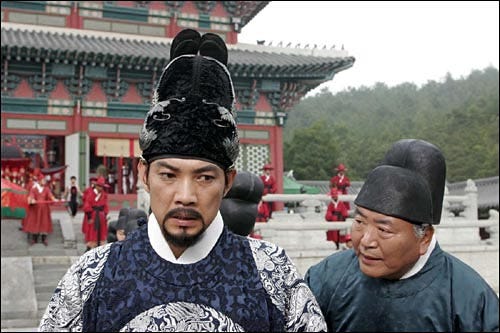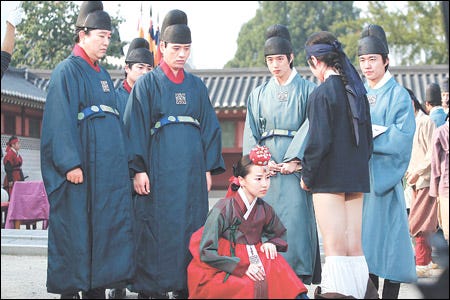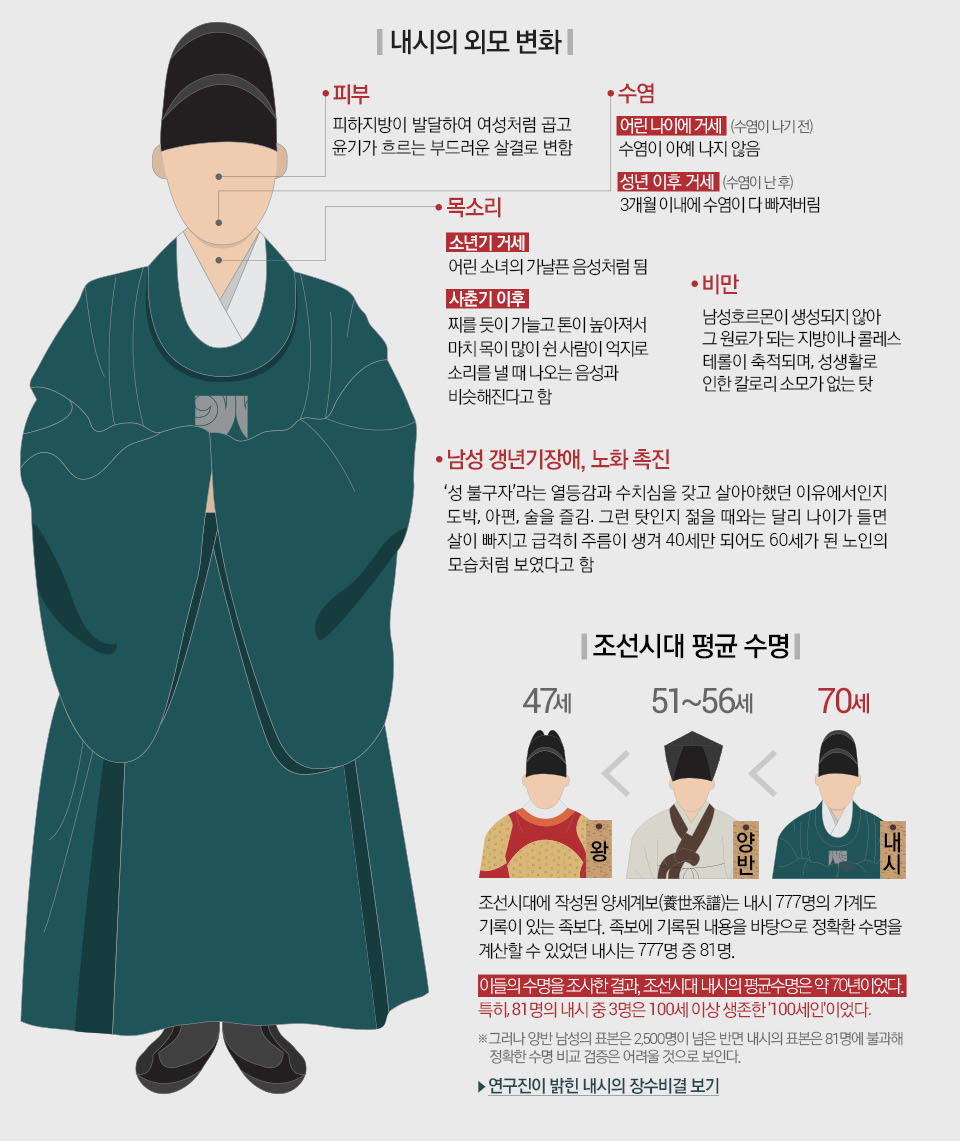I’ve specifically narrowed the time period to the Joseon Dynasty for this topic because the names of the position and their roles inside the Royal court were slightly different between Goryeo and Joseon dynasties.
If you’re into history-based K-dramas, you’ve surely seen at least a few eunuchs. They’re usually the ones standing right next to the King, speaking in hush and feminine tones.
In Korean, they’re called 내시 (nae-shi, 內侍), 내관 (nae-gwan, 內官) or 환관 (hwan-gwan, 宦官). For all intents and purposes, these terms are used interchangeably.
The eunuchs were invariably the closest assistant-servants to the King and the royal family members, and contrary to what is widely believed, they were allowed to marry and raise a family (I’ll get to the details shortly).
Although they weren’t allowed to, some eunuchs had political clout, mostly of the usurpation and conniving kind, but there were a few who were brave enough to stand up to the King when he would get out of line.
Now, to the interesting back story of being a eunuch during the Joseon dynasty. Apparently, it was considered a desirable career at the time because of its high salary. Their monthly pay was about 150kg (~330 pounds) of rice plus other benefits, which (is hard to convert to today’s dollars but) amounted to at least 5 times higher than what common folk would make in a month. No mandatory retirement age, and a generous retirement package when they do. So, some of the poor families would coerce one of their kids, especially if they had many, to “apply” for this job by going through a certain physical mutilation.
In Korea, unlike China, they would remove only the testicles so that they would lose the ability to biologically father a child but still have sex. They also could marry and adopt children of the same last name. This is the part of history that you don’t learn in schools (I guess it would be a little weird to go into details about this sort of thing.)
In the early part of the Joseon Dynasty (I forget which King but it was one of the first five), there was a case of a Crown Prince’s wife having an affair with a eunuch, which ultimately led to the wife being expelled from the court and the eunuch put to death by neung-ji-cheo-cham (능지처참). Naturally, people without the knowledge of how the genital mutilation was performed always ask the same question. “How is that possible?” “It was still possible” was all you got without any further explanation.
Two factoids about the procedure itself. First, at the unsanctioned clinics (there were no known licensed clinics, btw) that performed the procedures, the “doctor” would ask the patient, “Are you willing to become a eunuch?” three times. And if there was a slightest of hesitation, the doctor would NOT do it. Secondly, the procedure was only done on a very specific day—when there is a loud lightning and thunder to drown out the scream.
The would-be eunuchs were put through some grueling tests as well. They would obviously have to pass the physical examination before they’re hired as interns. The internship lasted 10 years and on a regular basis, the candidates were tested on physical endurance or tolerance. For instance, they were forced to drink inordinate amount of water throughout the day and not go to the bathroom. Sand was put in their nostrils and they had to endure the chafing. All under the tenet of,
Whatever you shall hear, you will turn a deaf person, and
Whenever you want to speak, you will turn a mute person.
The Joseon eunuchs were allowed much more liberties (like being able to have intercourse, officially marry, and raise a family) than their Chinese counterparts. This was largely due to the long history of Chinese eunuchs abusing their close relationship with the emperor and usurping their power. Having a family outside of the royal court meant that the Joseon eunuchs had something to protect and fear, which consequently made them not overly get involved in the politics and power struggle.
This was also interesting. According to the above illustration offered by opentutorials.org website, when the testicles are removed before the age of puberty, facial hair will simply not grow at all and if they had any facial hair, they will naturally fall off within 3 months of the procedure. And the voice will become either like that of a young girl or someone with a high-pitched raspy voice.
Also, the hormonal imbalance often caused obesity but they apparently lived a lot longer than the King and the high ranking officials. The above illustration says that the average life expectancy of Joseon Kings were 47 (verified), the court officials about 53 (verified), whereas eunuchs lived until 70 (estimated), which is stunning considering the average life expectancy of males during Joseon is thought to be under 35 years of age.
So, if you were willing to sacrifice a big part of your life as a man and endure all sorts of humiliation (often subjected to ridicules) and physical difficulties, you could have had a long and prosperous life during the Joseon dynasty.








Thank you so much for this article. I am
Watching the first ever k-drama that takes a closer look at eunuch and how they were castrated and I was in shock!! Hence, I had to search if that was true or not
Wowza! Interesting read.